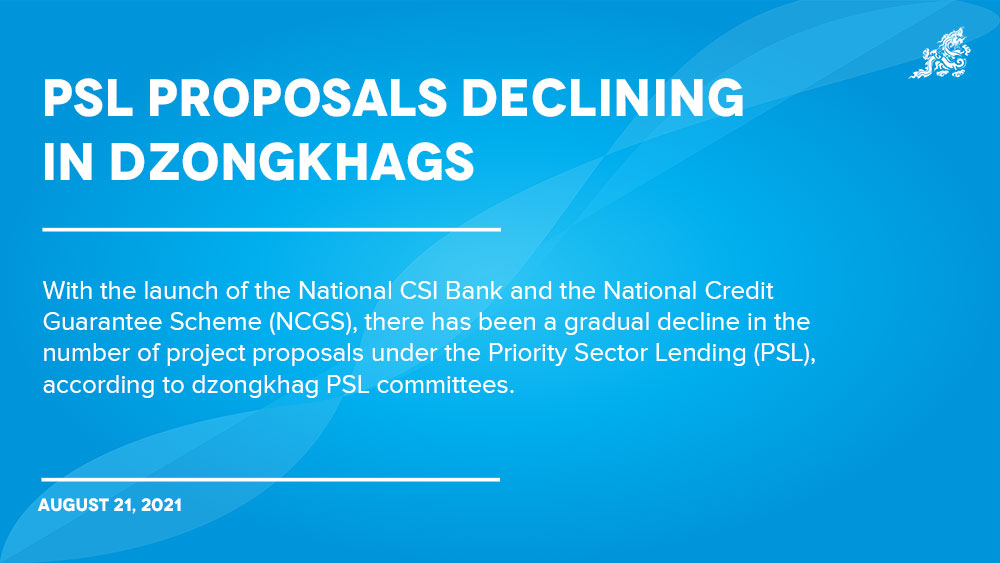MB Subba
With the launch of the National CSI Bank and the National Credit Guarantee Scheme (NCGS), there has been a gradual decline in the number of project proposals under the Priority Sector Lending (PSL), according to dzongkhag PSL committees.
The PSL is a special scheme to promote the cottage and small industries (CSIs), which account for about 95 percent of the country’s total industries, as a priority sector by providing collateral-free loans based on insurance on the proposed project assets.
A PSL proposal must be routed through the dzongkhag PSL committee chaired by the dzongdag, but it is up to the financial institution to accept or reject it.
Dzongkhag PSL committees say that the PSL proposals had almost stopped three and a half years after the launch of the scheme on January 1, 2018.
The Wangdue dzongdag, Sonam Jamtsho, said that number of PSL proposals had dropped after the launch of the CSI Bank. “We haven’t been receiving many applications of late.”
He, however, said PSL loans had significant impacts in the community as it provided employment to youths among others.
He said that most of the projects in the dzongkhag were in the agriculture sector and that the committee frequently visited the site to ensure that the project was implemented as per the plan.
According to the Dagana dzongdag, Duba, one of the reasons for receiving fewer PSL proposals was lack of adequate awareness on PSL among the people. “We don’t have many people coming with PSL proposals,” he said.
Samdrupjongkhar dzongdag, Tharchin Lhendup, attributed the decrease in the number of proposals to increased credit options. “But we will receive new proposals as the scheme is not closed.”
However, some bank officials said that they would not conclude that the PSL applicants had declined.
A Bhutan Limited (BOBL) official said, “We don’t give PSL loans for all the project proposals that come through the dzongkhag committee.”
According to the Royal Monetary Authority (RMA), the five financial institutions and the two insurance companies collectively sanctioned Nu 496.12 million (M) as of the end of March this year.
Since the scheme was launched, the 20 dzongkhag PSL committees approved 1,292 out 1,577 proposals and forwarded to financial institutions. The dzongkhag PSL committee can reject or approve a proposal.
However, financial institutions approved only 602 projects with an approval rate of about 46 percent. About 70 percent of the approved projects are in the agriculture CSI sector.
An official familiar with the scheme explained that financial institutions rejected more than half of the project proposals on the grounds of the proponent’s poor credit history among other reasons.
The main objective of PSL is to encourage commercial activities in the CSI sector through the engagement of groups, cooperatives and incorporated companies.
However, only a handful of proponents came in the form of groups and cooperatives. Most of the project proposals, according to RMA, are clustered around similar ideas.
Thimphu received the highest PSL loans with 163 beneficiaries, followed by Samtse and Trashigang Dzongkhag with 65 and 54 beneficiaries respectively.
Thimphu received 293 proposals, which was the highest among the 20 dzongkhags. About 78 percent of the projects were agriculture-related with the highest concentration in primary production.
In terms of gender composition, 874 applicants were male and 690 were female. The remaining, 13 applicants, comprised groups and cooperatives.
Officials say that scheme needed to improve in terms of coordination and implementation. For instance, he said that the relevant sector in the dzongkhag needed to provide assistance to the project more proactively.
Dzongkhag PSL officials said that there were less chances of misuse and diversion of funds as monitoring had increased.
Bank officials said that there were no issues related to non-performing loans as clients could defer the payment of equated monthly installments (EMI) till the end of June next year as part of the Druk Gyalpo’s Relief Kidu.
Meanwhile, the central bank has revised the PSL guidelines with the objective to transform the CSI sector into a more enterprising and commercially-oriented sector through coordinated interventions and better access to finance.
The PSL is also aimed at increasing opportunities for youth employment and promoting domestic production and import substitution.
A business with a fixed capital investment of less than Nu 1 million (M) is categorised as cottage scale while those with capital investment from Nu 1M to Nu 10M is categorised as small scale.
As per the guidelines, existing PSL clients are eligible for additional loans exceeding the existing ceiling of Nu 500,000 to individuals for primary production under the agriculture sector.
The interest rates ceiling for lending to primary production under agricultural CSI, and non-agricultural CSI and value addition in agricultural CSI are 8 percent and 8.5 percent respectively.
However, despite the introduction of such schemes the number of cottage and small industries (CSIs) decreased in 2021 from last year despite various initiatives for their growth in the economy.
As of June end, there were 20,582 licensed CSIs in the country, generating employment for more than 90,000 people, according to the cottage and small industries report 2020-21. In the same month last year, the number of licensed CSIs was 21,813.
Edited by Tashi Dema


